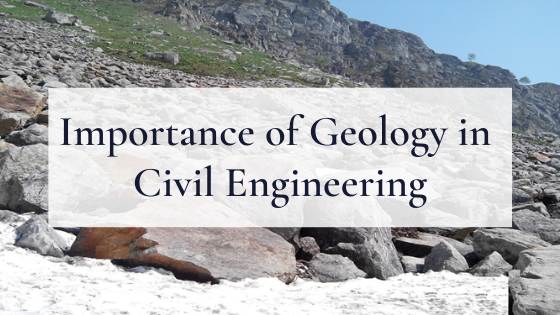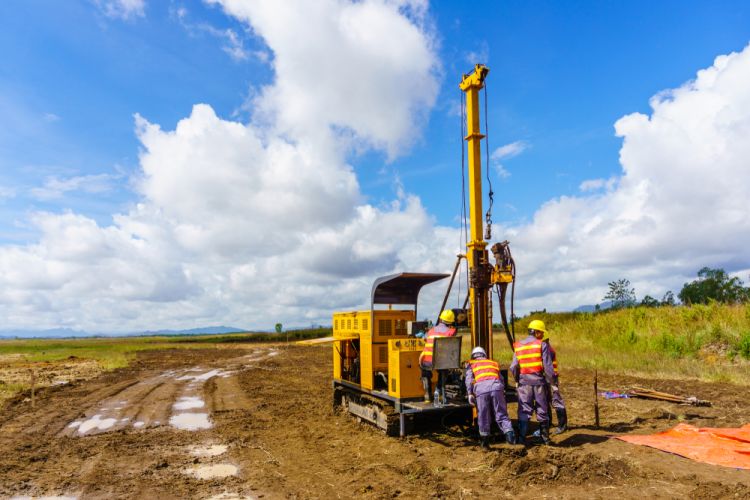What Does Specialized Geotechnical Engineering Solutions Mean?
What Does Specialized Geotechnical Engineering Solutions Mean?
Blog Article
3 Simple Techniques For Specialized Geotechnical Engineering Solutions
Table of ContentsNot known Details About Specialized Geotechnical Engineering Solutions Facts About Specialized Geotechnical Engineering Solutions RevealedA Biased View of Specialized Geotechnical Engineering SolutionsSpecialized Geotechnical Engineering Solutions - Questions
They perform site investigations, collect examples, perform lab tests, and analyze information to review the viability of the ground for building and construction jobs. Based upon their findings, geotechnical designers give referrals for structure style, slope stability, preserving structures, and reduction of geotechnical risks. They collaborate with various other professionals, such as engineers, structural designers, and construction teams, to ensure that geotechnical factors to consider are incorporated into the overall task layout and execution.
Foundation Layout: Geotechnical designers play a crucial function in designing structures that can safely sustain the desired structure. They analyze the soil conditions and tons demands to identify the suitable foundation kind, such as shallow foundations (e.g., footings), deep structures (e.g., piles), or specialized techniques like soil enhancement. They think about factors such as negotiation restrictions, birthing capability, and soil-structure communication to develop ideal foundation styles.
The Single Strategy To Use For Specialized Geotechnical Engineering Solutions
Right here are some kinds of geotechnical engineers: Structure Engineer: Foundation engineers concentrate on creating and evaluating structures for structures - Specialized Geotechnical Engineering Solutions. They assess the dirt problems, load needs, and site qualities to determine one of the most suitable structure kind and style, such as shallow foundations, deep foundations, or specialized techniques like pile foundations
They carry out field screening, accumulate examples, and evaluate the gathered information to characterize the dirt residential properties, geologic formations, and groundwater conditions at a site. Geotechnical Instrumentation Designer: Geotechnical instrumentation designers focus on monitoring and measuring the habits of soil, rock, and frameworks. They install and keep instrumentation systems that keep an eye on elements such as soil settlement, groundwater levels, slope activities, and structural displacements to analyze efficiency and give very early cautions of prospective concerns.
In the office atmosphere, geotechnical engineers utilize specialized software devices to execute calculations, produce layouts, and evaluate data. Specialized Geotechnical Engineering Solutions. They prepare reports, review job specs, communicate with clients and employee, and coordinate job tasks. The office setup gives a conducive atmosphere for study, evaluation, and partnership with various other experts associated with the project
They often visit project sites to perform site investigations, analyze geotechnical conditions, and gather information for analysis. These brows through include traveling to various locations, occasionally in remote or difficult surfaces. Geotechnical engineers might do soil tasting, conduct tests, and screen building and construction activities to guarantee that the geotechnical aspects of the project are being implemented correctly.
Some Known Details About Specialized Geotechnical Engineering Solutions
Geotechnical designers also operate in specialized geotechnical labs. In these centers, they conduct experiments, execute tests on soil and rock samples, and assess the engineering homes of the materials. Geotechnical laboratory get redirected here engineers function thoroughly in these settings, handling testing devices, running instruments, and recording data. They work together with other research laboratory staff to guarantee exact and trusted testing outcomes.
Maintaining Walls: Developing wall surfaces that hold back soil to stop landslides and give security on sloped terrains. Embankments and Earthworks: Creating embankments for roads, railways, and dams to ensure they continue to be secure under stress. The mining sector depends greatly on geotechnical engineering to make certain the security and longevity of its operations.
With this in mind, we have actually developed our program to prepare pupils for success. The Geotechnical Engineering program at the College of Delaware provides opportunities for sophisticated study and study in: Soil and rock technicians Soil-structure communication Integral modeling Computational geomechanics Structure and planet structures engineering Ground renovation Incline security and landslide stablizing Liquefaction of soils and quake engineering Lab characterization of geomaterials and dirt reinforcement Ecological geotechnics Provided the strong demand for renovation to our nation's infrastructurethe American Society of Civil Engineers gave the U.S.
Geotechnical design is a branch of civil engineering; nevertheless, it involves using scientific methods and principles to collect and translate the physical properties of the ground. Geotechnical designers are involved in all stages of the layout of frameworks, from concept to building. Their job is vital in the layout and planning process as they evaluate the stability of dirt, clay, silt, sand, and rock, before building and construction commencing.
The Only Guide for Specialized Geotechnical Engineering Solutions
This is followed by a ground examination based on the findings of the desk research and involves trial matching and sampling to reveal any kind of potential concerns. Geotechnical designers work within multidisciplinary teams, supported by intermediate and jr engineers as well as by CAD technicians. As an elderly geotechnical designer on a hydro plant project, jobs may include participating in technical evaluations (e.g., peer testimonials), tailings dam assessments, dam safety and security reviews, and other research studies connected to the design and construction of mine waste facilities.
While some professionals are experts only in geotechnics, others may function under titles like design rock hound or ground engineer within comparable capacities. As a geotechnical designer, you'll require to: build and keep relationships with clients and various other specialists associated with the site, throughout each projectmaintain safety and security criteria on site be conscious of cost effects when you make recommendationsstudy geological maps and airborne pictures from a variety of sources and from various time periodsexamine construction prepares to see exactly how feasible they are based on your understanding of the siteinvestigate threats or geological dangers for the sitesearch for eco delicate features, such as landfill beginning to establish accurate and expository ground modelsplan field investigationsdrill and analyse samples of bedrock, browse around this web-site dirt, groundwater and extra products manage other specialists on sitesolve technological concerns as they occur, such as unexpected structures at drill sitesmonitor problems throughout and after building and construction to ensure frameworks are steady in the brief and lengthy termadd information gathered on website to your first researchcreate geotechnical estimations, illustrations, and two or three-dimensional computer designs interpreting see it here the datamake referrals regarding the recommended usage of the website.
There are great deals of possibilities to meet new individuals, as you'll collaborate with a variety of experts at every website. The work can be demanding as you might be accountable for the security of others while on website. There is also a high level of financial duty, as the referrals you make can have serious expense implications.

Report this page